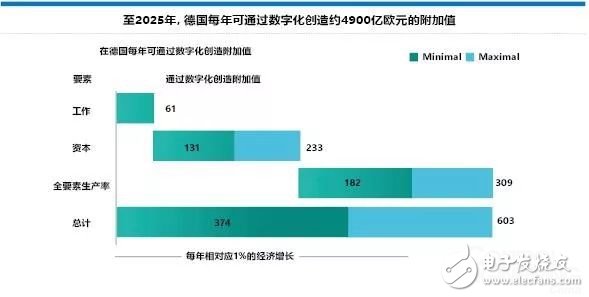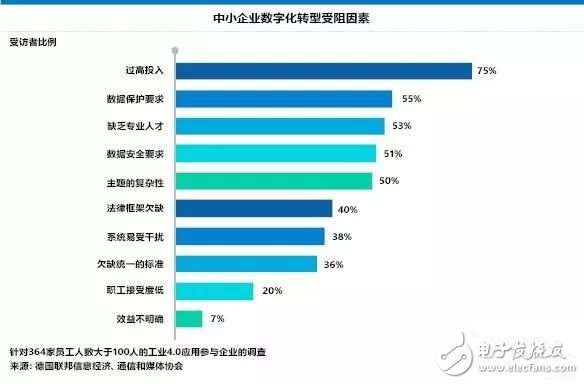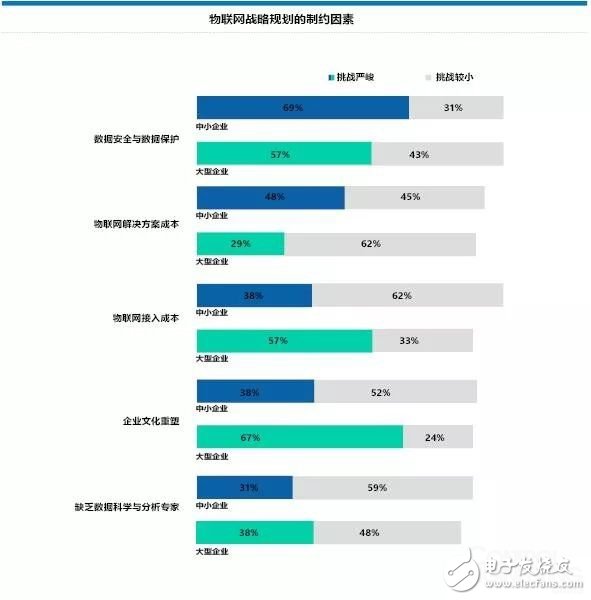As an established industrial manufacturing country, Germany has an important position in the world economy. This status is inseparable from the contribution of domestic SMEs. SMEs accounted for 99.7% of the total number of German companies, the company's net output value accounted for half of the country, and SMEs accounted for 60% of German employment. Dynamic SMEs have become an important pillar of the German economy.
Nowadays, in the context of the digital economy, whether the German manufacturing industry with many small and medium-sized enterprises can fulfill the historical responsibility of undertaking digital economic growth and successfully complete the digital transformation of enterprises has become one of the topics of concern to all circles in Germany. McKinsey & Co. has predicted that if German SMEs thoroughly implement the digital transformation strategy and implement the corresponding digital solutions, it will bring about 0.3% annual growth to the German economy.
So what is the reality? Is the German SME owner taking digital as an opportunity or an adventure? What is their digital strategy?
According to a report issued by the German Commercial Bank, although 86% of German SMEs believe that digitalization brings huge opportunities to enterprises, only 1 in 6 companies have taken practical actions. 63% of companies are still waiting to see, they believe that digital is still too far away for enterprises, although digital can simply reduce production costs and increase production efficiency.
Despite this, a survey by the business consulting firm Horváth & Partners confirms the strength of German digital SMEs in digital transformation. At present, nearly 50% of the companies surveyed are already experimenting with smart products, that is, devices or systems that can communicate with other machines, and already have an “island solution†in the entire industrial digitalization field, but they are quite mature and have a market. The ability to apply. Compared with large companies, SMEs with an annual turnover of 500 million to 1 billion euros have a digital maturity of 26% higher than group companies with annual turnover of more than 1 billion euros. It can be seen that the “giant†of these small and medium-sized enterprises is the main driving force for the digital transformation of the German economy.
However, a survey entitled “Digital Psychology†published by the InnovaTIve Alliance, a partnership of IT, Cisco, Damovo and Inneo SoluTIons, shows that German SMEs are in the process of digital transformation of the German economy. Hold a very contradictory mentality. The SMEs decision-makers surveyed believe that digital transformation is very important, can help companies improve efficiency, reduce costs, expand sales, and feel that this is an adventure. The extraordinary capital investment in digital transformation exceeds their economic affordability. Therefore, the digitalization process of German SMEs is also facing a lot of challenges.
So, what are the factors that hinder the digitalization process of German SMEs? How can the German community help them cope together?
The German Federal Institute for Information Economy, Communication and Media (Bitkom) found in a survey of 364 SMEs who are practicing digitalization or planning to transform digitally, 75% of business owners believe that excessive financial pressure is their implementation of digital transformation The biggest obstacle. Other factors, such as concerns about data protection, lack of professionals, concerns about data security, and overly large factories, have left nearly half of business owners discouraged from digital transformation.
It is an indisputable fact that enterprises need to invest heavily in digital transformation. First of all, digitalization must involve the entire value creation chain, including digital training for employees. It also requires a lot of money to develop a digital strategy, hire full-time IT experts, large investment costs, and uncertain economic benefits, making most SMEs under great pressure.

In response to this situation, the German government cooperates with the industry to share the pressure on funds for SMEs and give policy encouragement. In 2016, the German Federal Ministry of Economics and Energy released the "Digital Strategy 2025", which described the objectives of the digital focus areas and proposed corresponding implementation measures. The core element of the digital offensive for SMEs is to fund the “Small and Medium Enterprises Digital Investment Projectâ€, which will have a total funding of 1 billion Euros in 2018. The project aims to identify the difficulties of gap projects and expand existing SME support projects such as the Small and Medium Enterprise Innovation Program (ZIM) project and the Industrial Community Research (IGF) project. The two projects received €700 million and €200 million in expansion funds to meet growing funding needs.
TIschlerei Eigenstetter, a wooden furniture workshop from Korbach, Germany, was the beneficiary of the project. You know, for this 25-year-old SME, the biggest headache for them was the hand-made furniture. These handcrafts are not only costly to manufacture, but often do not meet the perfect standards. Under the auspices of the ZIM project, Eigenstetter and the Fraunhofer Institute in Germany collaborated to develop an automated process for the construction of cutting production of very large, complex wood or plastic, as well as the development of scanning systems in raw materials. The virtual positioning of the finished product, through the combination of computer-aided design (CAD), scanning system and automated processing, completed the digital transformation of the enterprise. The entire process achieves more efficient, higher quality and more resource-efficient manufacturing of custom furniture, further ensuring the competitive advantage of the company. At the 2016 International Light Industry and Handicrafts Fair in Munich, German Chancellor Merkel visited the booth of TIschlerei Eigenstetter and expressed his appreciation for the courage to dare to carry out the digital transformation and congratulated the company on its achievements.
In addition, from the German Ministry of Economics and Energy, in conjunction with the German economic and financial circles, the Future Action Plan for SMEs, we understand that in order to meet the requirements of the digital economy and focus on maintaining and enhancing the competitiveness of the German economy, Germany will implement a series of New policies and support measures, including creating a better financing environment for the development of German SMEs.
No matter how advanced the “unmanned factoryâ€, people play a crucial decision-making role in it. With the continuous development of industrial digitalization and the emergence and use of new knowledge and new technologies, the demand for talent quality in factories will also change, and knowledge-based skills workers will become mainstream. German professional and technical talents mainly come from vocational schools that implement dual-system education, that is, the educational model that combines the study of school theoretical knowledge with the practical operation of factories. This makes the vocational education in Germany face the market, and the work skills of professional and technical personnel should be adjusted in time according to the needs of the market. The key to the smooth implementation of the German Industry 4.0 strategy is whether Germany has a large number of new professional and technical personnel, which will provide a basis for Germany to continue to lead the world in manufacturing development. At the same time, this also brings new opportunities and challenges to the future development of German vocational education.
Baden-Württemberg in southwestern Germany is a gathering place for many small and medium-sized enterprises. The state government has long recognized this problem and is actively meeting the challenge. As early as April 2015, the state government announced a grant of 4 million euros to build 12 “learning factories 4.0†in major vocational and technical schools to cope with the changes in labor demand for digital transformation. By setting up such a learning factory, people who need training can truly feel the problems that need to be solved in the real work, and then carry out some practical research and simulation on these problems. In such a simulated environment, students do not need to be 100% guaranteed to deliver a high-quality, high-efficiency assignment, but instead focus on the ability to train them to solve problems in this problem-oriented environment. When they return to work after receiving training, they will find that they have improved a lot in solving problems. This not only allows the trainees of students and enterprises to have a digital comprehensive literacy, but also makes up for the talent gap caused by the transformation.
“Industry 4.0†is a digital transformation driven by data and software, which brings a new proposition that is open and crosses organizational boundaries. Here, there are both new system dependencies and new forms of attack, which exposes information security to a huge weakness. Therefore, every small step of digitization is promoted, and more powerful network security is needed to support it. Many companies are reluctant to fully exploit big data because they feel they can't protect the security of the generated data. In Germany, between 2015 and 2016, more than one-third of companies have experienced cybercrime. More importantly, many companies simply can't detect that they have been cybercrime, or they are afraid to report to the official agencies because they are afraid of damage to the network data. While SMEs are limited by technology and funding issues, the possibility of data breaches is even greater and will not be remedied once they are disclosed. Insecure network can also cause intellectual property leakage, which is even more fatal for enterprises. 60% of the data theft and cyber espionage cases known to date involve SMEs, with an annual amount of up to 51 billion euros. In the digital age, how to ensure the data security of small and medium-sized enterprises, how to establish a stable and effective firewall, and how to improve employees' safety awareness also limit the pace of SME decision-makers entering the digital age.
To solve this problem, in the past two years, 12 research institutes including the Fraunhofer Institute for Applied Research Promotion in Germany have been developing their so-called "Industrial Data Space" solutions. , a virtual architecture based on standard communication interfaces for secure data sharing. Its main feature is data sovereignty, which allows users to monitor and maintain control of their proprietary data by deciding who has access to and for what purpose.
The research project has received funding of 5 million euros from the German Federal Ministry of Education and Research. The project has now entered the second phase of research. In the second phase of the study, the Fraunhofer Institute simulated a variety of attack scenarios in a virtual inspection lab, constantly improving the information security system and developing targeted security defense strategies.


At the same time, Germany is also actively embracing new technologies to solve data security and intellectual property protection issues. From the forum of the Hannover Fair in 2018, we can see that more and more data experts are beginning to discuss the combination of blockchain technology and "Industry 4.0".
The digital transformation of enterprises is not just a simple process of upgrading hardware and software. As a systems engineering, corporate decision makers face many challenges, such as the challenges of standards, the challenges of strategy and business models, and the challenges of industrial complexity. The lack of awareness of digital transformation by SME owners is also a common problem in today's industrial upgrading in Germany.
In order to let SMEs better understand digitalization, under the “SME 4.0 Digital Production and Workflow†funded project, Germany has established more than 10 SME Digital Competence Centers across the country, aiming to make SME owners at home. Experience the technical and economic potential of digitalization.
The objectives of the “SME 4.0 Digital Production and Workflow†promotion plan are: First, to make SMEs aware of digitalization, including the technical and economic potential and challenges brought by Industry 4.0; Second, to help SMEs through demonstration and experimentation Some safe, reliable, market-ready applications that meet the needs; and third, provide information and knowledge for established outcome translation agencies and information media.
Munsch from Westerwald, Germany, is a medium-sized company specializing in the production of chemical plastic pumps for the transport of various concentrated sulfuric acid, hydrochloric acid, nitric acid, acetic acid, hydrofluoric acid and hydrazine, organic solvents, oxidants and other media. Or highly corrosive chemical liquid, which is an ideal product for transporting suspended solids containing particles and easily crystallized corrosive liquids in metallurgy, steel, chemical, pharmaceutical, electroplating, environmental protection and other units. Due to the wide variety of applications, the requirements for each product are not the same, Munsch needs to be customized according to the requirements of different customers.
Through digital technology, Munsch has improved the entire production process: in the past, in order to produce individual components, personnel were required to manually program the machine. Although it is only a procedural step, sometimes inevitable errors occur, resulting in production errors, and subsequent remediation often costs the enterprise too much. Through cooperation with the Darmstadt SME 4.0 Competence Center, the Munsch Product Configurator can be directly interconnected with production equipment. With the product configurator, complete automation of machine programming is possible, and the production equipment can be automated without the need for extra steps as before. After the information flow from the customer to the production equipment is opened, the supply time of the product is reduced. Munsch Enterprise Manager Stefan Munsch concluded: “The whole process is based on a standardized information chain, and the data is not faulty, allowing us to achieve personalized, error-free processing. This not only saves programming costs, but also guarantees Quality, but most importantly: Munsch shortens the entire product time period."
The digital transformation, whether it is for advanced manufacturing countries like Germany or China at different stages of industrial level, has great challenges from different levels. But one thing is certain. The future development of SMEs plays a vital role in both the Chinese economy and the German economy. Indeed, supporting small and medium-sized enterprises is not an easy task and requires very detailed support strategies and policy care. In the current environment of China's smart manufacturing, the author can feel that SMEs are constantly marginalized. Most of the resources and policies are tilting toward large enterprises, and SMEs seem to have been forgotten as a whole. How to effectively implement support and support for SMEs is a question worth pondering.
Connector brand: JST, MOLEX, HIROSE, JWT, DEPHI, TE, Deutsch, Yazaki, Sumitomo, these are very popular
Conector type: board to board connector, wafer connector
Yacenter is professional factory, specialize in wire harness in transportation, medical, house applicance and so on.
We are one of menbership of WHMA with ellecellent team, and pass UL, TS, CE certificate.
We develope high-tech engineering, prototyping, and qualify manufacturing at very competitive pricing for connector system.
Connector System,Cable Harness,Wiring Harness Wire,Custom Auto Wiring Harness
Dongguan YAC Electric Co,. LTD. , https://www.yacentercn.com